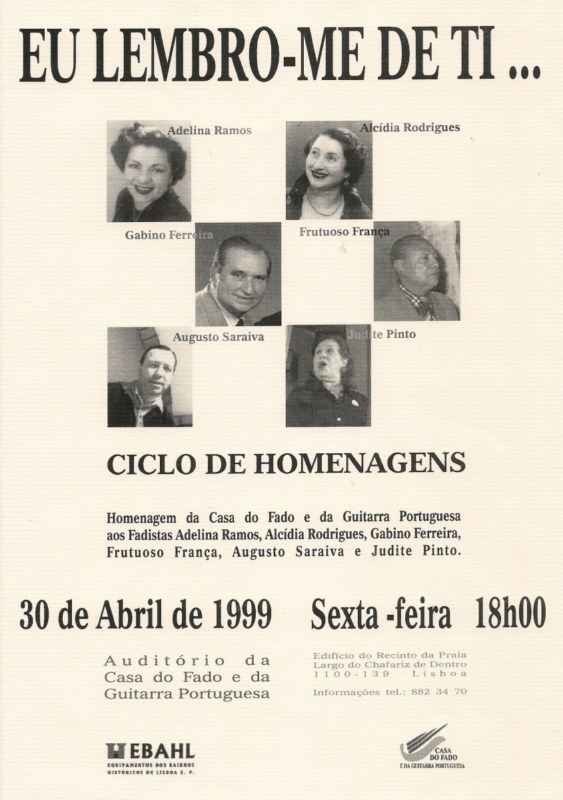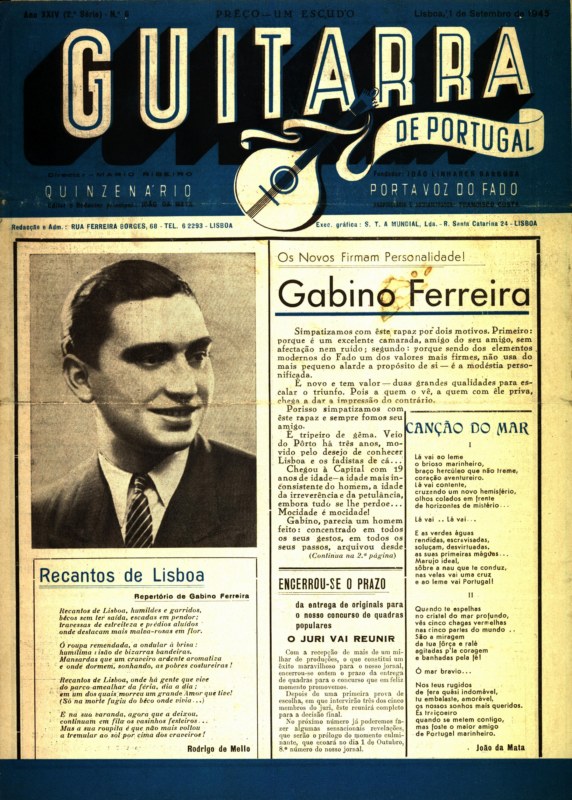Know more:
Gabino Ferreira
(N. 13 November, 1922 - M. 22 November, 2011)Gabino Ferreira was introduced to the fado universe at a very early stage, listening to it on the radio. In 1936 his father encouraged him to sing the fado at charity shows as an amateur, in the outskirts of Porto. Later on his fado skills enabled him to sing at "Café Portugal" and "Café Academia", earning his first money. In this period he became known in the milieu of fado as "Miúdo do Bonfim". In 1938 he performed at "Café Portugal", in Rua de Trás, the most important fado house in Porto, and then at "Café Mundial", in Rua da Madeira, and "Café Academia", at Avenida dos Aliados.
In 1942 travelled to Lisbon, where he celebrated his twentieth birthday. That very same night, he performed at "Esplanada Luso", formerly "Retiro da Severa", singing "Cabelo Branco", accompanied by Jaime Santos and Miguel Ramos. (cf. Radamanto, in "Guitarra de Portugal", 15 June 1945). He never returned to Porto, contrary to what had been scheduled; impresario Lopes Ferreira (of "Café Luso") asked him to stay and join his fado singer cast.
In 1945, after finishing his military service duties, he performed at "Retiro dos Marialvas" accompanied by José Nunes (Portuguese guitar) and Miguel Ramos (Spanish guitar). He returned to "Luso" and left it once more, to join the cast of "Adega Machado".
His repertoire included illustrious Porto authors, like Manuel Mendes, Alberto Ferrador and José Maria da Silva. Later on he also sang poets like Linhares Barbosa, Francisco Radamanto, "Britinho" and e Carlos Conde.
He opened restaurant "A Severa" as artistic manager, matching this activity with his job at Companhia dos Telefones, where he worked for 37 years. Later on he retired from artistic life, at an early stage.
During his stay in Lisbon he never forgot his roots and returned to Porto whenever possible, to perform in several fado houses, theatres and other venues.
He had live shows at radio broadcasters Emissora Nacional, Rádio Peninsular and Rádio Graça, and the Emissora Nacional radio broadcaster awarded him Honours.
Among his vast repertoire, reference should be made to a few of his hits, namely "Lenda da Amendoeira" and "O fado está doente", by Carlos Conde, the eternal "Cabelo Branco", by Manuel J. Nogueira, and other poems by his fellow countrymen.
In 1979 label “Riso e Ritmo” invited him to record a LP called "Fado da Velha Guarda" together with Júlio Vieitas, Manuel Calixto, José Coelho, Frutuoso França. This is one of the 3 records in the career of Gabino Ferreira.
Source:
"Canção do Sul", 16 July 1943
"Canção do Sul", 1 March 1944
"Canção do Sul", 1 October 1944
"Guitarras de Portugal", 15 June 1945
"Guitarras de Portugal", 1 September 1945
"Guitarras de Portugal", 15 November 1945
"Canção do Sul", 16 November 1945
"Guitarras de Portugal", 25 December 1945
Baptista-Bastos (1999), "Fado Falado", Col. "Um Século de Fado", Lisboa, Ediclube;
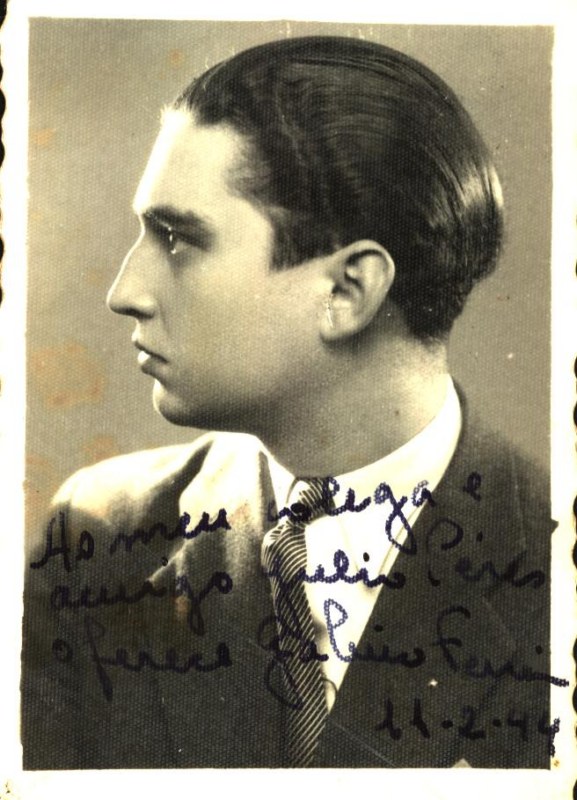
Gabino Ferreira, s/d.
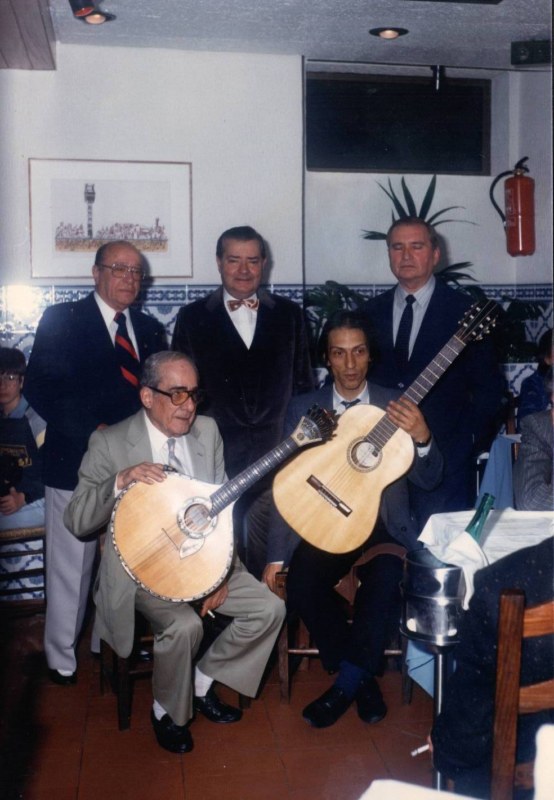
Júlio Peres, Júlio Vieitas, Gabino Ferreira, Francisco Carvalhinho, Filipe Pinto Junior Canto do Camões, 1987
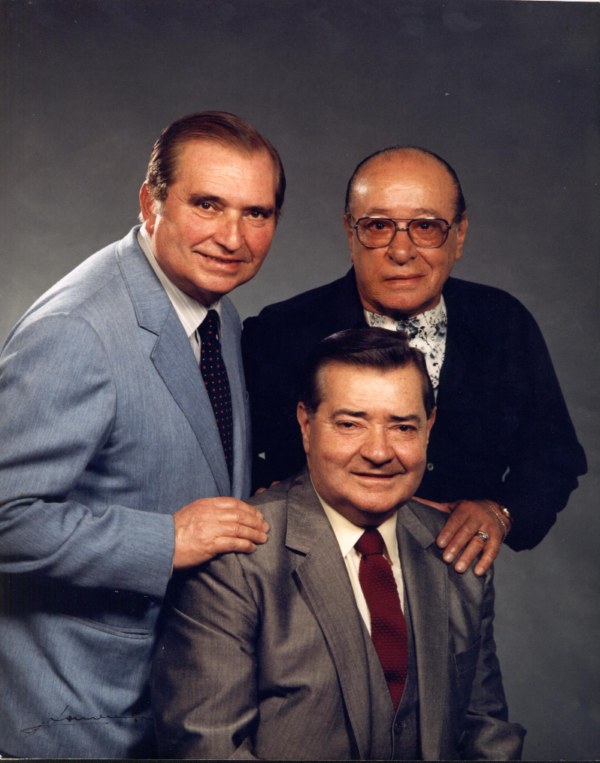
Gabino Ferreira, Júlio Vieitas e Júlio Peres, s/d.
-
Alfama Gabino Ferreira (Henrique Perry / Joaquim Campos)
